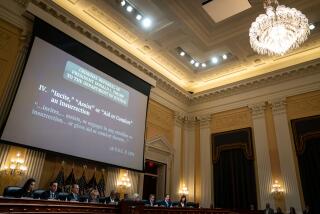White House to provide lawmakers with more details on Libya
The White House responded Tuesday to claims by House Speaker John A. Boehner (R-Ohio) that the Obama administration is close to violating the War Powers Act by saying that it is in “the final stages” of preparing a package of information for members of Congress that will help clarify the United States’ role in Libya.
“We are in the final stages of preparing extensive information for the House and Senate that will address a whole host of issues about our ongoing efforts in Libya, including those raised in the House resolution as well as our legal analysis with regard to the War Powers Resolution,” said National Security Council spokesman Tommy Vietor.
Vietor noted that since March 1, administration witnesses have testified at more than 10 hearings that included “a substantial discussion of Libya and participated in over 30 member or staff briefings, and we will continue to consult with our congressional colleagues.”
Boehner, in a letter to President Obama, had warned the administration that it needs to obtain congressional approval for further operations, as Sunday will mark the 90th day since U.S. forces have been engaged militarily in the NATO-led operation, the limit set by the act.
The speaker said many lawmakers are frustrated by the “lack of clarity” about the administration’s strategy in Libya.
Debate in Congress, Boehner wrote, “originated with a lack of genuine consultation prior to commencement of operations and has been further exacerbated by the lack of visibility and leadership from you and your Administration.”
The tussle comes as the House is about to begin debate the annual defense spending bill for fiscal 2012.
Earlier this month, the House overwhelmingly approved a resolution requiring the president to report within two weeks on the scope of the mission, a vote that was largely seen as a bipartisan rebuke of the administration’s failure to seek congressional approval for the military effort.
The War Powers Act, passed by Congress near the end of the Vietnam War, has been the subject of a long-running dispute between Congress and the executive branch, which has questioned whether the president’s powers as commander in chief can be curtailed by congressional legislation.
More to Read
Get the L.A. Times Politics newsletter
Deeply reported insights into legislation, politics and policy from Sacramento, Washington and beyond. In your inbox three times per week.
You may occasionally receive promotional content from the Los Angeles Times.











